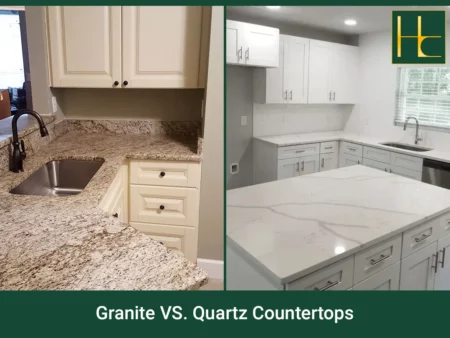
There are many factors that you must look at when you decide what sort of countertops you want in your home. A general contractor will tell you that it is important to look at composition, cost, appearance, durability, maintenance, environmental impact, and DIY sustainability. Here, we will take a look at two different materials that are popular for countertops: granite and quartz.
When looking at countertops, composition is the first factor you must consider. Granite countertops are hunks of excavated rock. These countertops are created entirely of organic rock that is straight from stone quarries. It’s sliced into slender chunks, refined, and made into surfaces.
On the flip side, Quartz countertops are artificial gemstone goods produced with quartz pieces or powder combined with resins. Much of the substance is made up of minerals. However, up to 15 percent may be rosin and stains. Quartz countertops aren’t pieces of quarried stone.
A second factor to look at is cost. While both of these materials are expensive, it might be worthwhile to know that if you have a lower budget, you may not be able to afford them. Generally, granite countertops will run approximately $40 to $100 per square foot, while quartz countertops can be expected to run anywhere from $50 to $75 per square foot. With quartz tops, you will also need to pay $10 to $30 per square foot to install it.
Next, you will want to think about the appearance of your countertops. You will find that granite countertops are special because they do not look like each other. Each slab will have a different pattern or color, with very dramatic veining. Quartz countertops have a more uniform appearance, with each piece looking almost identical.
A general contractor will tell you to look for materials that are very durable. There are factors to pay attention closely to include:
- Cracking: Granite is very prone to cracking, while quartz is not known to crack.
- Cold and hot cycles: Granite may crack if there are periods of cold cycles that transform into hot cycles.
- Heat resistance: Both granite and quartz are heat-resistant. You will find that granite is able to take higher temperatures than quartz.
Maintenance is another element that you will want to concentrate on when you are picking your countertop materials. Sealing granite must be completed when installed. This somewhat permeable stone requires regular sealing on a continuing basis. Quartz won’t necessitate sealing because the rosin is utilized in the construction of the chunks.
Let’s take a peek at bacterial defiance. Quartz is less vulnerable to holding bacteria due to the rosin, which makes the area not as spongy as granite.
Whether you live in or near Tampa or in other places in the Sunshine State, environmental impact should be a factor you look at when picking countertops. While both kinds of countertops are produced from natural materials, radon emissions in the granite countertops are a concern for some. However, it has been said that it’s highly unlikely that radiation from granite might expand yearly radioactivity amounts higher than normal, innate background amounts.
And finally, you will want to consider DIY sustainability when it comes to both granite and quartz materials. Both of these materials are harder to install. Therefore, you will want to find a general contractor to assist you with this.
If you are near Tampa, consider calling Hybrid GC for all your granite or quartz countertop needs. This general contractor company can provide you with the best service, whether you are remodeling a home or building a new house.
